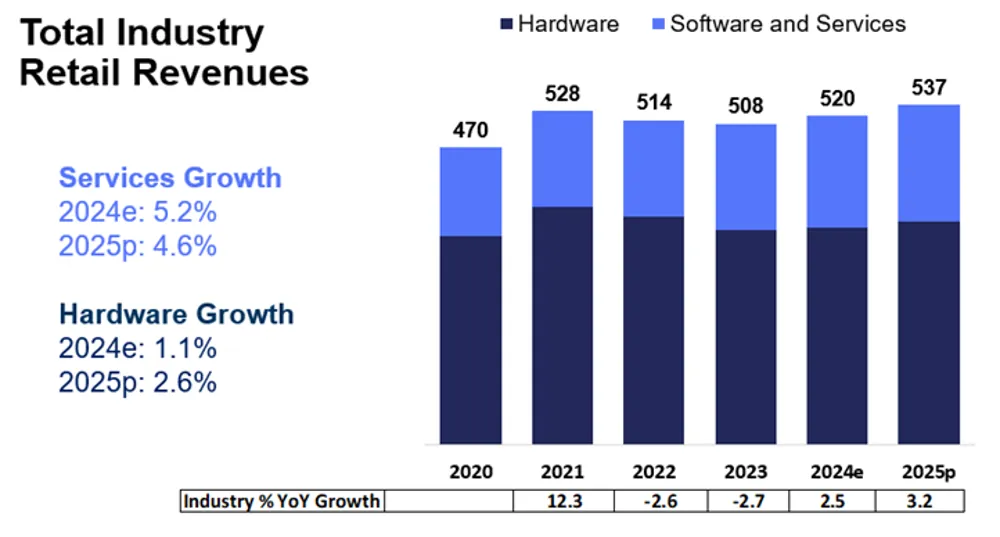현지시간으로 6일 전세계 최대 가전 박람회 CES 2025가 개최를 앞둔 가운데 도널드 트럼프 미국 대통령 당선인의 2기 취임식이 2주 앞으로 다가와 있다. 관세 전쟁이 개시되면 미국 IT·빅테크 기업에도 타격이 불가피할 것으로 보이는 가운데 가전·소비재의 가격 상승이 우려되고 있는 상황이다.

▲총 산업 수익, CTA US 소비자 기술 1년 산업 예측 / (자료:CTA)
美 관세 장벽, IT 소비 37~68% 감소
“무역 보복, 비용 높이고 공급망 파괴”
현지시간으로 7일 전세계 최대 가전 박람회 CES 2025가 개최를 앞둔 가운데 도널드 트럼프 미국 대통령 당선인의 2기 취임식이 2주 앞으로 다가와 있다. 관세 전쟁이 개시되면 미국 IT·빅테크 기업에도 타격이 불가피할 것으로 보이는 가운데 가전·소비재의 가격 상승이 우려되고 있는 상황이다.
미국소비자기술협회(CTA)에서 발표한 미국 소비자기술 산업전망에 따르면 2025년 미국 소비자 기술 산업이 전년대비 3.2% 성장한 5,370억달러(한화 약 789조6,048억원)를 기록할 것으로 예상한다고 5일 밝혔다. 이는 IT제품 및 서비스에 대한 소비자 지출이 증가 신호인 것으로 나타났다.
CTA 최신 조사에 따르면 트럼프 대통령 당선자의 관세 장벽 정책으로 인해 스마트폰과 노트북을 포함한 소비자들이 선호하는 IT 제품 부문에서 가격 인상의 압력이 있을 것으로 전망했다.
최신 보고서는 관세로 인해 IT 제품에서 미국 소비자의 구매력이 900~1,430억달러 감소할 수 있다고 예측하며, 노트북 및 태블릿 구매는 최대 68% 감소, 게임 콘솔 소비는 최대 58% 감소할 수 있으며, 스마트폰은 최대 37% 감소할 수 있는 것으로 추정했다.
게리 샤피로 CTA CEO는 “기술 부문은 미국 경제 엔진으로 글로벌 혁신과 일자리 창출을 주도하고 있다”면서, “관세 전망은 글로벌 경제에서 기술의 디플레이션적 힘으로 위협한다”고 말했다. 이에 그는 미국 행정부와 의회가 성장 중심의 혁신 의제 우선을 촉구한다고 밝혔다.
에드 브르지트 CTA 무역 부사장은 “트럼프 행정부는 관세가 미국 기업과 소비자에 미칠 영향을 해결해야 한다”고 제언하며, “무역 파트너에 대한 보복은 비용을 높이고 공급망을 파괴하며, 미국 산업의 경쟁력을 손상시킨다”고 우려했다.
한편, 반도체·AI 부문에서 치열한 미·중 기술·무역 패권 전쟁이 목전으로 다가온 가운데 2025년 격변하는 글로벌 정국에 대비해 한국 정부의 대응방안 모색과 리더십 부재 상황이 해소될지 귀추가 주목된다.
